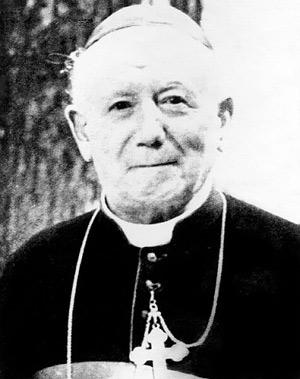Jules Saliège

The face of the commitment of the Catholic church in France towards the internees, Mgr Saliège was the first French prelate to protest against the deportation of Jews from the Récébédou and Noé camps. Jules Saliège, originally from the Cantal, was destined from an early age into the priesthood. He entered the small seminary in Pleaux and then enrolled at the large seminary in Issy-les-Moulineaux. He was ordained on 21 September 1895 and two years later became the Superior at Saint-Flour, after having taught philosophy and ethics there. Mobilised in 1914, during the war he was a volunteer military chaplain. He was posted to the 163rd infantry division. Demobilised in 1918, he returned to his duties at the head of the seminary before being appointed Bishop of Gap in 1925. Pious XI made him Archbishop of Toulouse and Narbonne in 1928 to succeed Mgr Germain. In 1931, he was paralysed following an attack of hemiplegia. After the Armistice of 22 June 1940, Mgr Saliège added a political hue to his pastoral activity, standing up against the racial laws of the Vichy government in March 1941.
He went into action out in the field, supporting the charities helping those detained (republicans Spaniards, Jews and the politically opposed), in the camps at Noé and Récébédou. In August 1943, he was the first French prelate to denounce the use of the French camps as an anti-chamber of Auschwitz. On 23 August 1942, he wrote in a pastoral letter: "That children, women, men, fathers, mothers should be treated as a wretched herd, that members of the same family should be separated from one another and embarked for unknown destinations, was a sad spectacle reserved for our times to see... In our diocese terrible scenes have taken place in the camps of Noé and Récébédou. These Jews are men, these Jewesses are women. All is not permissible against them... They belong to mankind. They are our brothers like so many others. No Christian can forget that." Although it was banned by prefectorial decree, this letter was still read out in most parishes and, most importantly, was taken up and transmitted by the BBC. In September 1942, the Récébédou camp was closed. At the same time, he organised the resettling of Jews in the area surrounding Toulouse. Other ecclesiastical figures followed his example, including Mgr Théas, in charge of the diocese of Montauban. On 24 March 1944, addressing French Catholic scouts leaving for Germany, he openly criticised national socialism and was almost deported, escaping from this fate because of his reputation and the state of his health. On the Liberation, General de Gaulle awarded him the medal of the Résistance and made him Companion of the Liberation (law of 7 August 1945). In October 1945, on his sacerdotal jubilee and his appointment as assistant at the pontifical throne, Mgr Saliège was cheered by the crowd for his acts of resistance. On 18 February 1946, he was made Cardinal Priest of S. Pudenziana by the Consistory.
Weakened by his hemiplegia, he was assisted by Mgr Garrone, but continued to occupy the role of chancellor of the Toulouse catholic institute and to be a member of the Roman Congregations of the Sacraments, Nuns and Ceremonials. He died on 4 November 1956 at the age of eighty-six and is buried in the Saint-Etienne cathedral in Toulouse.
His writings reflect a life of commitment: Lettre pastorale de Mgr l'Archevêque de Toulouse (pastoral letter of Mgr Archbishop of Toulouse), (1937); Notes de son Excellence Mgr Saliège (Notes of his Excellency Mgr Saliège) (1945) ; Un Evêque français sous l'Occupation (A French Bishop under the Occupation) (1945) ; Le Temps présent et l'action catholique (The Present Time and Catholic Action) (1946) ; Le Prêtre, le Temps présent et l'Action catholique (The Priest, the Present Time and Catholic Action) (1946) ; Les menus Propos du Cardinal Saliège (Cardinal Saliège's Small-talk) (1947) ; Lourdes Pax Christi (1948) ; Lettre pastorale de S.E. le Cardinal Archevêque de Toulouse au Clergé et aux fidèles de son diocèse (Pastoral letter from the S.E. Cardinal Archbishop of Toulouse to the Clergy and the faithful of his diocese)(1948) ; Son Excellence Mgr Gabriel Brunhès, Evêque de Montpellier 1932-1949 (His Excellency Mgr Gabriel Brunhès, Bishop of Montpellier 1932-1949) (1949) ; Ma vie par le Christ. Lettre du Cardinal Saliège et de Mgr Houssaron, (My life in Christ. Letter from Cardinal Saliège and from Mgr Houssaron (1952) ; Mgr Maisonobe, Evêque de Belley, 1882-1954 (Mgr Maisonobe, Bishop of Belley, 1882-1954 (1955).
Related articles
- First World War
- L'internement : La France des camps (1938-1946)
- Les camps dans le Gers (32)
- Les camps d'internement dans les Hautes-Pyrénées (65)
- Les camps dans les Pyrénées-Atlantiques (64)
- Camps dans les Pyrénées-orientales (66)
- Les autres camps dans le Tarn-et-Garonne (82)
- Liberation of the camps

